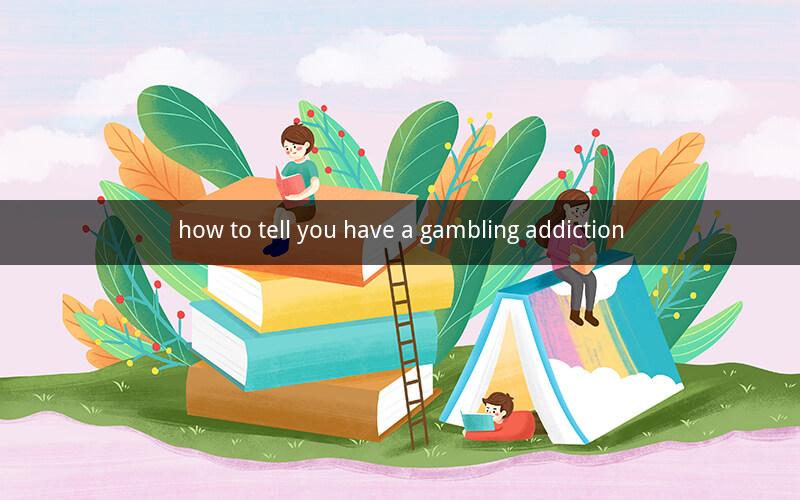
How to Tell You Have a Gambling Addiction
Table of Contents
1. Understanding Gambling Addiction
2. Signs and Symptoms of Gambling Addiction
3. The Impact of Gambling Addiction on Your Life
4. Risk Factors for Developing a Gambling Addiction
5. Seeking Help for Gambling Addiction
6. Treatment Options for Gambling Addiction
7. Support Systems for Recovering from a Gambling Addiction
8. Coping Strategies for Preventing Relapse
9. The Importance of Self-Reflection and Change
10. The Role of Family and Friends in Supporting Recovery
1. Understanding Gambling Addiction
Gambling addiction, also known as problem gambling, is a condition characterized by an uncontrollable urge to gamble despite negative consequences. It is a chronic condition that can affect individuals of all ages, genders, and backgrounds. Understanding the nature of gambling addiction is crucial in identifying and addressing the issue.
2. Signs and Symptoms of Gambling Addiction
Identifying the signs and symptoms of gambling addiction can help individuals recognize the problem and seek help. Common signs include:
- Feeling preoccupied with gambling thoughts
- Needing to gamble more money to achieve the same thrill
- Feeling restless or irritable when attempting to cut down or stop gambling
- Using gambling as a way to escape problems or negative emotions
- Lying to family, friends, or therapists about gambling activities
- Continuing to gamble despite negative consequences, such as financial, relationship, or legal problems
3. The Impact of Gambling Addiction on Your Life
Gambling addiction can have severe consequences on various aspects of an individual's life, including:
- Financial problems: Accumulating debt, losing savings, or even stealing to support gambling habits
- Relationships: Strained relationships with family, friends, and partners due to lying, secrecy, or neglect
- Mental health: Depression, anxiety, and other psychological issues resulting from the stress and guilt associated with gambling
- Legal issues: Being arrested for fraud, theft, or other crimes committed to support gambling activities
4. Risk Factors for Developing a Gambling Addiction
Several factors can increase the risk of developing a gambling addiction, including:
- Genetic predisposition: A family history of addiction can increase the likelihood of developing a gambling addiction
- Psychological factors: Individuals with certain personality traits, such as impulsivity and a need for thrill, may be more susceptible to gambling addiction
- Environmental factors: Exposure to gambling opportunities, such as casinos or online gambling sites, can increase the risk of developing an addiction
5. Seeking Help for Gambling Addiction
Seeking help is the first step in overcoming a gambling addiction. Here are some options for seeking assistance:
- Professional help: Therapists, counselors, and psychologists specializing in gambling addiction can provide personalized treatment
- Support groups: Joining a support group, such as Gamblers Anonymous, can offer emotional support and practical advice from individuals who have experienced similar challenges
- Self-help resources: Utilize online resources, books, and other materials to educate yourself about gambling addiction and develop coping strategies
6. Treatment Options for Gambling Addiction
Treatment for gambling addiction can vary depending on the individual's needs. Common treatment options include:
- Cognitive-behavioral therapy (CBT): A type of therapy that helps individuals identify and change negative thought patterns and behaviors associated with gambling
- Medication: Certain medications may be prescribed to help manage symptoms of depression or anxiety related to gambling addiction
- Residential treatment: Some individuals may benefit from a residential treatment program that provides a structured environment for recovery
7. Support Systems for Recovering from a Gambling Addiction
Building a strong support system is essential for recovering from a gambling addiction. This can include:
- Family and friends: Encourage loved ones to provide emotional support and participate in therapy sessions
- Support groups: Joining a support group can provide ongoing support and guidance from individuals who have overcome similar challenges
- Professional support: Maintain regular contact with therapists, counselors, or other professionals involved in the recovery process
8. Coping Strategies for Preventing Relapse
To prevent relapse, individuals with gambling addiction should develop and practice coping strategies, such as:
- Identifying triggers: Recognize situations or emotions that may lead to gambling and develop strategies to avoid or cope with them
- Establishing boundaries: Set strict limits on gambling activities and avoid situations that may encourage gambling
- Engaging in healthy activities: Fill time with productive and enjoyable activities that do not involve gambling
9. The Importance of Self-Reflection and Change
Self-reflection is a crucial aspect of overcoming a gambling addiction. Individuals should:
- Acknowledge their addiction and take responsibility for their actions
- Identify the underlying causes of their addiction and work towards addressing them
- Make a commitment to change and develop a plan for maintaining sobriety
10. The Role of Family and Friends in Supporting Recovery
Family and friends play a vital role in supporting individuals recovering from a gambling addiction. They can:
- Educate themselves about gambling addiction to better understand the challenges faced by their loved ones
- Offer emotional support and encouragement throughout the recovery process
- Help hold their loved ones accountable for their actions and progress
Questions and Answers
1. What is the difference between problem gambling and gambling addiction?
2. Can someone with a gambling addiction recover?
3. How can I tell if I have a gambling problem?
4. Are there any medications available to treat gambling addiction?
5. Can therapy help me overcome my gambling addiction?
6. How can I support a loved one struggling with a gambling addiction?
7. What are some coping strategies for managing cravings to gamble?
8. Can I recover from a gambling addiction on my own?
9. How long does it take to recover from a gambling addiction?
10. What should I do if I suspect a child has a gambling addiction?